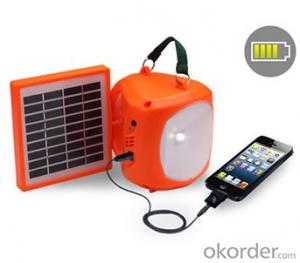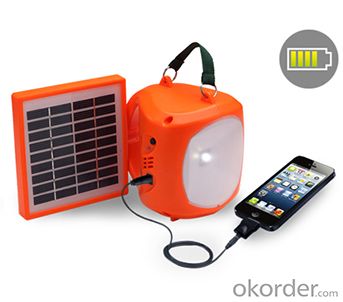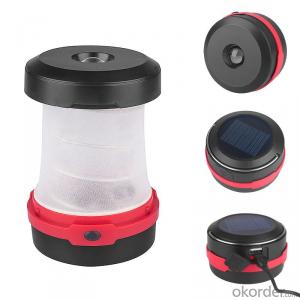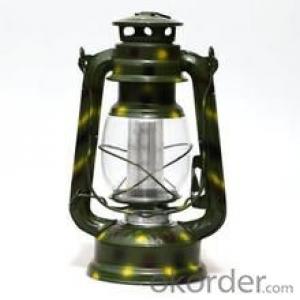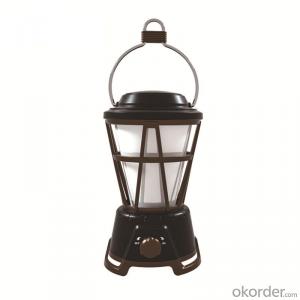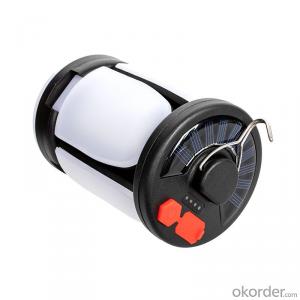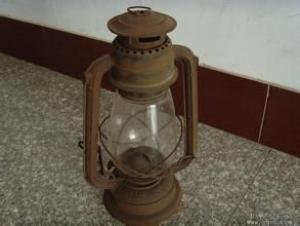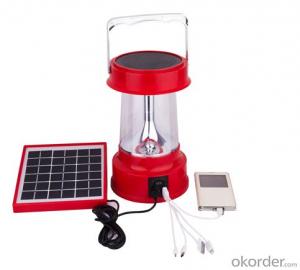Advanced Solar Energy Systems Solar Camping Lantern
- Loading Port:
- Guangzhou
- Payment Terms:
- TT OR LC
- Min Order Qty:
- -
- Supply Capability:
- 10000 unit/month
OKorder Service Pledge
Quality Product, Order Online Tracking, Timely Delivery
OKorder Financial Service
Credit Rating, Credit Services, Credit Purchasing
You Might Also Like



Main characteristics
1. Support two charging modes: Solar charging/ AC charging.
2. Convenient and easy to use durable with beautiful appearance.
3. 4 switches to adjust, high brightness/lower brightness/cell phone charger output/power off.
4. No wire, no installation, no hassle, fast and easy to install.
5. Green and energy saving and widely used.
Technical parameter
| Material | Transparent plastic PC/ABS |
| Solar Panel | Mono crystalline 1.5W |
| Battery | 6V/3500mAh |
| LED | 1W(1PCS) |
| Output | 5V/550mA |
| Charging Time | 10 hours charged by AC current, 22 hours charged by solar energy |
| Illumination Time | 10 hours for high brightness, 20 hours for lower brightness |
| Packing Measure | 175*140*155mm |
| Weight | 1.1KG |
| Accessories | AC Adapter/Cell phone charging cable with 3 different connectors |
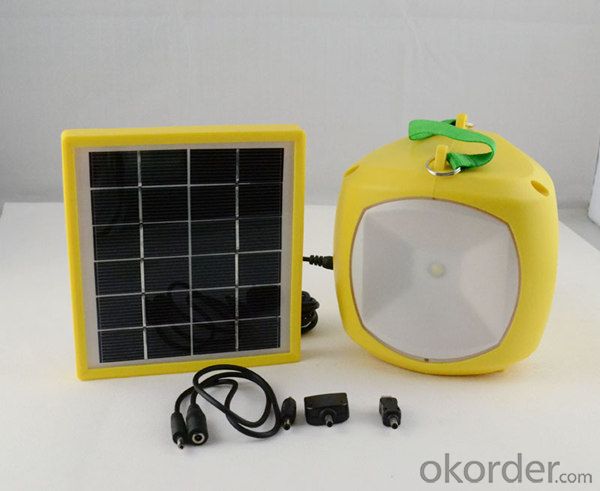
- Q: Can solar energy systems be used in residential buildings?
- Yes, solar energy systems can be used in residential buildings. They are increasingly being installed in homes to generate electricity and heat water, reducing reliance on traditional energy sources and lowering electricity bills.
- Q: How do solar energy systems impact regional economic development?
- Solar energy systems have a positive impact on regional economic development in several ways. Firstly, they create job opportunities in the installation, manufacturing, and maintenance sectors. This leads to increased employment rates and income levels, stimulating economic growth. Secondly, by reducing reliance on fossil fuels, solar energy systems lower energy costs for businesses and households, freeing up funds that can be invested in other sectors. Furthermore, solar projects attract investment and promote innovation, fostering a sustainable and resilient economy. Overall, solar energy systems contribute to job creation, cost reduction, and investment attraction, all of which drive regional economic development.
- Q: Can solar energy systems be used in powering research laboratories or scientific facilities?
- Yes, solar energy systems can certainly be used to power research laboratories or scientific facilities. Solar energy is a renewable and sustainable source of power that can be harnessed through the use of photovoltaic (PV) panels or solar thermal systems. Research laboratories and scientific facilities often require a significant amount of electricity to power various equipment such as microscopes, centrifuges, spectrometers, and other specialized scientific instruments. By installing solar panels on the rooftops or surrounding areas of these facilities, they can generate electricity from the sun's rays. The energy generated by solar panels can be used directly to power the laboratory's equipment, reducing their reliance on traditional fossil fuel-based electricity sources. Additionally, excess energy produced by the solar panels can be stored in batteries or fed back into the grid, ensuring a continuous and reliable power supply. There are several benefits to using solar energy in research laboratories and scientific facilities. Firstly, it helps reduce greenhouse gas emissions and mitigates the environmental impact of these facilities. Solar power is clean and does not produce any harmful pollutants, making it an environmentally friendly alternative to conventional electricity sources. Moreover, solar energy systems can provide a stable and cost-effective source of power in the long run. Although the initial installation costs may be higher, solar panels have a long lifespan and require minimal maintenance. This can lead to significant savings on electricity bills over time, allowing research laboratories and scientific facilities to allocate their resources towards other important research activities. Furthermore, solar energy systems can enhance the resilience and reliability of power supply to these facilities. In areas prone to power outages or with unreliable electricity grids, solar panels combined with battery storage can provide a backup power source, ensuring uninterrupted operation of critical scientific equipment. In conclusion, solar energy systems can indeed be used to power research laboratories and scientific facilities. They offer numerous environmental, economic, and operational advantages that make them a viable and sustainable choice for meeting the energy needs of these important scientific institutions.
- Q: How do solar energy systems impact the stability of the electrical grid?
- Solar energy systems can have both positive and negative impacts on the stability of the electrical grid. On one hand, solar energy systems help diversify the energy mix by providing a clean and renewable source of electricity. This reduces the reliance on fossil fuels and decreases greenhouse gas emissions, leading to a more sustainable and environmentally friendly grid. Additionally, solar energy systems can contribute to grid stability by reducing the peak demand for electricity during daylight hours. During sunny periods, solar panels produce electricity at their maximum capacity, which can offset the need for fossil fuel-based power plants to operate at their peak levels. This can help alleviate strain on the grid during times of high demand and prevent potential power outages or blackouts. However, solar energy systems also pose challenges to the stability of the electrical grid. One of the main challenges is intermittency. Solar power generation is dependent on weather conditions, so it fluctuates throughout the day. This intermittency can create imbalances between electricity supply and demand, which can destabilize the grid. To mitigate this issue, grid operators must carefully manage the integration of solar energy systems into the grid by employing advanced forecasting and grid management technologies. Furthermore, the high penetration of solar energy systems in certain regions can lead to over-generation during peak solar production hours. This excess electricity may not be efficiently utilized or stored, potentially causing voltage fluctuations and grid instability. Grid operators need to invest in energy storage technologies such as batteries to store surplus solar power and release it when needed, ensuring grid stability. In conclusion, solar energy systems have a significant impact on the stability of the electrical grid. While they contribute to a cleaner and more sustainable energy mix, their intermittent nature and potential for over-generation require careful grid management and the integration of energy storage technologies. With proper planning and investment, solar energy systems can play a crucial role in achieving a stable and resilient electrical grid.
- Q: Can solar energy systems be used for powering electric battery manufacturing plants?
- Yes, solar energy systems can be used for powering electric battery manufacturing plants. Solar energy is a clean and renewable source of energy that can be harnessed through photovoltaic (PV) panels to generate electricity. These PV panels convert sunlight into electricity, which can then be used to power various industrial operations, including electric battery manufacturing plants. Solar energy systems can be installed on the rooftops of these manufacturing plants or on nearby open spaces. The generated electricity can be used directly to power the manufacturing operations, reducing the reliance on fossil fuel-based power sources and decreasing greenhouse gas emissions. Additionally, any excess electricity generated can be stored in batteries for later use, ensuring a continuous and reliable power supply even during periods of low sunlight. By utilizing solar energy systems, electric battery manufacturing plants can significantly reduce their carbon footprint and contribute to a more sustainable energy future. This not only aligns with the global efforts to combat climate change but also helps in reducing the operational costs associated with traditional power sources.
- Q: Can solar energy systems be used for powering off-grid space exploration missions?
- Yes, solar energy systems can be used for powering off-grid space exploration missions. Solar panels can be deployed on spacecraft to capture and convert sunlight into electricity, providing a reliable and renewable source of power for various systems and instruments onboard the spacecraft. The use of solar energy systems eliminates the need for traditional fuel-based power sources, reducing the weight and complexity of the mission while enabling extended durations in space. Additionally, solar energy systems have been successfully utilized by numerous space missions, including the International Space Station and Mars rovers, demonstrating their effectiveness and reliability in off-grid space exploration.
- Q: Can solar energy systems be used to heat water?
- Yes, solar energy systems can be used to heat water through the use of solar thermal collectors or solar water heaters. These systems absorb sunlight and convert it into heat, which is then used to warm the water for various purposes such as domestic use, swimming pools, or even industrial processes.
- Q: How does net metering work?
- Net metering is a billing arrangement that allows solar panel owners to earn credits for excess electricity they generate and feed back into the grid. Essentially, it works by measuring the difference between the electricity a consumer consumes from the grid and the surplus electricity they produce. This surplus is then credited to their account, offsetting their future energy consumption and allowing them to save money on their utility bills.
- Q: How long does a solar energy system last?
- A solar energy system typically lasts for about 25 to 30 years.
- Q: Are there any tax credits available for solar energy systems?
- Yes, there are tax credits available for solar energy systems. The federal government offers a Solar Investment Tax Credit (ITC), which allows homeowners and businesses to deduct a percentage of the cost of installing solar energy systems from their federal taxes. Additionally, some states also provide their own tax incentives for solar installations, making it more affordable for individuals and businesses to go solar.
Send your message to us
Advanced Solar Energy Systems Solar Camping Lantern
- Loading Port:
- Guangzhou
- Payment Terms:
- TT OR LC
- Min Order Qty:
- -
- Supply Capability:
- 10000 unit/month
OKorder Service Pledge
Quality Product, Order Online Tracking, Timely Delivery
OKorder Financial Service
Credit Rating, Credit Services, Credit Purchasing
Similar products
Hot products
Hot Searches
Related keywords
